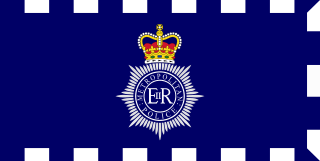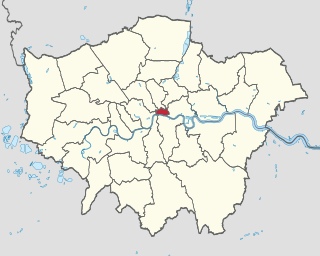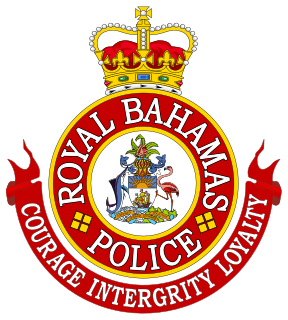A constable is a person holding a particular office, most commonly in criminal law enforcement. The office of constable can vary significantly in different jurisdictions. A constable is commonly the rank of an officer within the police. Other people may be granted powers of a constable without holding this title.

The Metropolitan Police Service (MPS), formerly and still commonly known as the Metropolitan Police, is the territorial police force responsible for the prevention of crime and law enforcement in Greater London. In addition, the Metropolitan Police is also responsible for some specialised matters throughout the United Kingdom; these responsibilities include co-ordinating and leading national counter-terrorism measures and the personal safety of specific individuals, such as the Monarch and other members of the Royal Family, members of the Government, and other officials.

The Police Service of Northern Ireland is the police force that serves Northern Ireland. It is the successor to the Royal Ulster Constabulary (RUC) after it was reformed and renamed in 2001 on the recommendation of the Patten Report.

Law enforcement in the United Kingdom is organised separately in each of the legal systems of the United Kingdom: England and Wales, Northern Ireland and Scotland. Most law enforcement is carried out by police officers serving in regional police services within one of those jurisdictions. These regional services are complemented by UK-wide agencies, such as the National Crime Agency and the national specialist units of certain territorial police forces, such as the Specialist Operations directorate of the Metropolitan Police.

The City of London Police is the territorial police force responsible for law enforcement within the City of London, including the Middle and Inner Temples. The force responsible for law enforcement within the remainder of the London region, outside the city, is the much larger Metropolitan Police, a separate organisation. The City of London, which is now primarily a financial business district with a small resident population but a large commuting workforce, is the historic core of London, and has an administrative history distinct from that of the rest of the metropolis, of which its separate police force is one manifestation.

The Commissioner of Police of the Metropolis is the head of London's Metropolitan Police Service. Sir Mark Rowley was appointed to the post on 8 July 2022 after Dame Cressida Dick announced her resignation in February.
Chief constable is the rank used by the chief police officer of every territorial police force in the United Kingdom except for the City of London Police and the Metropolitan Police, as well as the chief officers of the three 'special' national police forces, the British Transport Police, Ministry of Defence Police, and Civil Nuclear Constabulary. The title is also held by the chief officers of the principal Crown Dependency police forces, the Isle of Man Constabulary, States of Guernsey Police Service, and States of Jersey Police. The title was also held, ex officio, by the president of the Association of Chief Police Officers under the Police Reform Act 2002. It was also the title of the chief officer of the Royal Parks Constabulary until this agency was disbanded in 2004.
A chief of police is the title given to an appointed official or an elected one in the chain of command of a police department, particularly in North America. A chief of police may also be known as a police chief or sometimes just a chief, while some countries favour other titles such as commissioner or chief constable. A police chief is appointed by and answerable to a national or local government, with the main exception being elected sheriffs in the United States.
Most of the police forces of the United Kingdom use a standardised set of ranks, with a slight variation in the most senior ranks for the Metropolitan Police and City of London Police. Most of the British police ranks that exist today were chosen by Home Secretary Sir Robert Peel, the founder of the Metropolitan Police, enacted under the Metropolitan Police Act 1829. The ranks at that time were deliberately chosen so that they did not correspond with military ranking, because of fears of a paramilitary force.

Cambridgeshire Constabulary is the local territorial police force that covers the county of Cambridgeshire and Peterborough unitary authority. It provides law enforcement and security for an area of 1,311 square miles (3,400 km2) and population of 856,000 people, in a predominantly rural county. The force of Cambridgeshire includes the cities of Cambridge, Ely and Peterborough, the market towns of Chatteris, Huntingdon, March, Ramsey, St Ives, St Neots, Whittlesey, and town and Port of Wisbech. Its emblem is a crowned Brunswick star containing the heraldic badge of Cambridgeshire County Council.
Inspector is a police rank and an administrative position used in a number of organizations. The rank or position varies in seniority depending on the organization that uses it.
Police commissioner is a senior rank in many police forces of the world. In other jurisdictions, it is the title of a member of an oversight board.
Deputy assistant commissioner (DAC), formally Deputy Assistant Commissioner of Police of the Metropolis, is a rank in London's Metropolitan Police Service between assistant commissioner and commander. It is equivalent to deputy chief constable in other British police forces and wears the same insignia: a pip above crossed tipstaves within a wreath.
Deputy chief constable (DCC) is the second highest rank in all territorial police forces in the United Kingdom. The British Transport Police, Ministry of Defence Police, Civil Nuclear Constabulary, and the Isle of Man Constabulary each also has a DCC.

The Isle of Man Constabulary is the national police service of the Isle of Man, an island of 85,000 inhabitants, situated approximately equidistant from Northern Ireland, Wales, Scotland and England.

The Royal Bahamas Police Force is the national law enforcement agency of the Commonwealth of The Bahamas. It operates within the portfolio of the Ministry of National Security. The police force was established on 1 March 1840. The Force is headquartered on East Street Hill in Nassau, Bahamas.

Dame Lynne Gillian Owens is a retired senior law enforcement officer in the United Kingdom. She served as Director-General of the National Crime Agency from 2016 to 2021, making her one of the most senior law enforcement chiefs in the United Kingdom at the time, and is due to serve a six month term from September 2022 as acting Deputy Commissioner of the Metropolitan Police Service. She was Assistant Commissioner of Central and Territorial Operations with the Metropolitan Police Service from 2010 to 2012, and the Chief Constable of Surrey Police from 2012 to 2015.
A Counter Terrorist Specialist Firearms Officer (CTSFO) is a United Kingdom police firearms officer. The CTSFO standard is the highest Authorised Firearms Officer level in the National Police Firearms Training Curriculum (NPFTC) and was established by the Metropolitan Police Service in the lead up to the 2012 Summer Olympics held in London on 27th of July. The firearms units of police forces organise CTSFOs into teams to establish a police tactical unit.
The police in Canada's ranks differ according to the different police forces and depend on different laws at the federal, provincial, and municipal levels.








